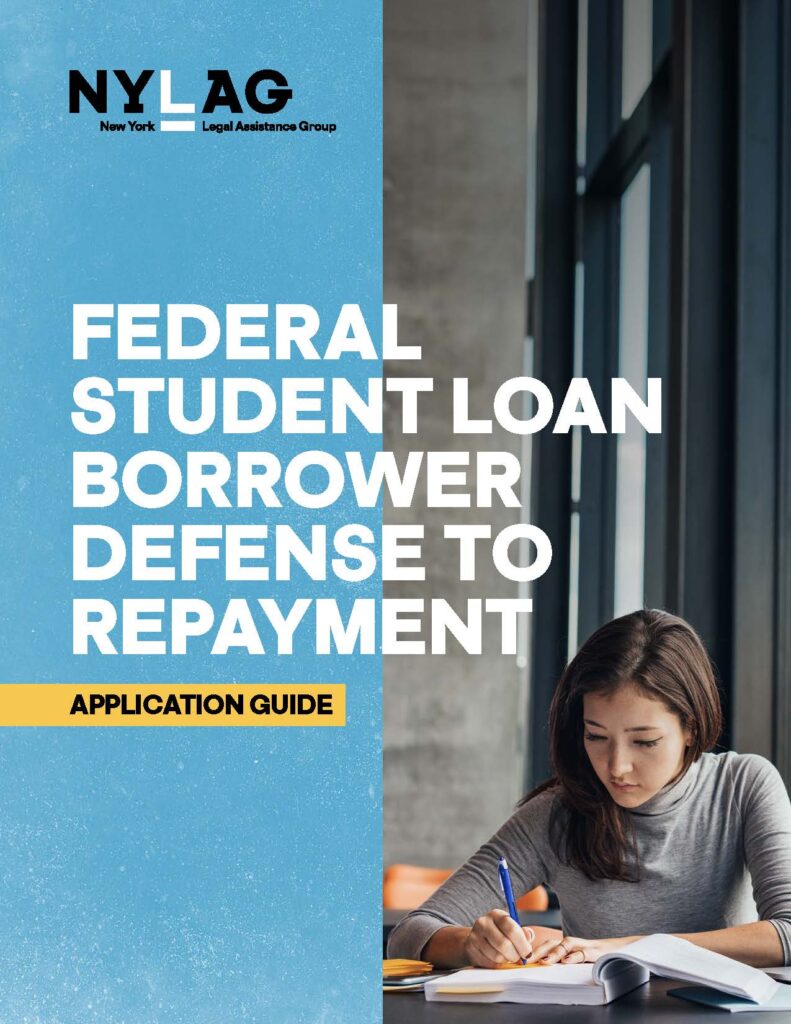Did your school mislead you, lie to you, or engage in other misconduct? Under the Borrower Defense to Repayment (or “Borrower Defense”) program, you may be able to have some or all of the loans borrowed to attend that school canceled. Under the borrower defense program, the Department of Education will provide relief if your college or university misled you or engaged in other misconduct in violation of certain state laws. Sometimes the Department of Education will automatically cancel loans for groups of students if it finds that a school or program at the school acted in a particularly bad way–this is called a “group discharge.” More information about the group discharges in effect is below. In most cases, you have to apply for Borrower Defense to Repayment by submitting an application to the Department of Education.
If you submitted a borrower defense application before November 2022, see the information at the bottom of this page.
What Type of Misconduct is Eligible for Borrower Defense to Repayment?
Generally, you have to be able to show that:

your school made misrepresentations to you (lied or misled you), or failed to tell you important information about something that was key to your decision to enroll in school in the first place; or

your school broke its contract with you (like, for example, failing to fulfill a promise in the school’s enrollment agreement or course catalog that was the basis for your decision to enroll).

You also have to show that the school’s misconduct caused you harm that warrants relief.
These issues are common for students who attend for-profit schools, where they try to enroll as many students as possible to maximize their profits.
Some examples of false or misleading statements that could be eligible for Borrower Defense to Repayment include:
- guaranteeing that students would get a job after graduation,
- making false statements about whether the program would make a student eligible for licensure for a specific profession,
- making false statements about how much graduates earned with their degree
- telling students that they would be able to transfer their credits to another school,
- hiding the true cost of the program,
- failing to tell the student that they were signing up for federal loans, and
- misleading students about the program’s ability to meet requirements for a specific license or certification necessary for a job.
If you believe that your college or university engaged in these types of misrepresentations, you may be eligible for Borrower Defense to Repayment to have your loans canceled.
How Do I Apply for Borrower Defense to Repayment?
You can submit an application for Borrower Defense to Repayment online or in the mail using this form.
Before you apply, make sure to get together any documents you have to support your claim. These documents could include emails or other communications between you and your school, course catalogs, student handbooks, and advertisements from your school (such as web ads, social media ads, email ads, print ads, or links to tv ads). These documents may help refresh your memory about what your school did. If you do not have documents available–that’s OK! You should still submit an application.
When you fill out the application, include as many details as possible about the misrepresentations the school made to you. Make sure you explain and put in details to answer the following questions in your application:
- What exactly did the school say to you or fail to tell you? What was the misrepresentation, or what did the school do (what was the aggressive or deceptive recruitment)?
- Who told you this information? Including the person’s name and title, if you know it.
- When and where were you told this information? Such as the approximate date or time of year, and whether it was during a campus tour or interview, in a meeting, in an advertisement, or over the phone.
- How was the information communicated to you? For example, via email, in person, through an advertisement?
- How was this information deceptive or misleading, and how did you realize you were misled?
- Why was this information important to you when you enrolled?
- How were you harmed by the school’s misconduct? Would you still have attended the program if you’d known the truth? Were you able to get a job using your degree? Did you default on your student loans?
After you submit your application, it may be months before you hear from the Department of Education. If your application is denied, you may be able to appeal it.
Need More Help?
The New York Legal Assistance Group (NYLAG) has created a free guide to help you apply for Borrower Defense to Repayment.

Will my loans be discharged even if I didn’t file a borrower defense application?
From 2020 until October 2025, the Department of Education announced it would provide relief to the following groups of students, even if they never submitted a borrower defense application:
- ITT: Students who attended from 2005 through its closure in 2016.
- Corinthian Colleges (Heald College, Everest College, WyoTech): Students who attended a Corinthian-owned school between 1995 through its closure in 2015.
- Marinello: Students who attended between 2009 through its closure in 2016.
- Westwood: Students who attended from 2002 until its closure in 2016.
- Art Institutes: Students who attended from Jan. 1, 2004, until its closure in 2017.
- Ashford University: Students who attended from March 1, 2009, through April 30, 2020.
- Center for Excellence in Higher Education: Students who attended Independence University, CollegeAmerica, Stevens-Henager College, and California College San Diego between 2006 and Aug. 1, 2021.
- Drake College of Business: Students who attended between 2008 and the school’s closure in 2015.
- Lincoln Technical Institute–specific programs and campuses: Students who attended the criminal justice program at the Lowell campus from 2010 to 2012 or the Somerville campus from 2010 to 2013.
If you attended one of the above schools during the relevant time period and you have outstanding Direct, FFEL loans, or Department-held Perkins loans (the most common types of federal student loans) that you borrowed to attend the above predatory schools, the Department should provide you with relief on those loans. All types of Direct and FFEL loans, including Parent PLUS loans, are included. If you are eligible for relief, the eligible outstanding loans will be cancelled, and the Department of Education will delete any negative credit history related to those loans on your account, even if you did not submit a borrower defense application.
If you had Department-held loans, you will also receive a refund of the payments made on those loans (Department-held loans include all Direct Loans; more information about how to see whether your loans are Department-held is available here.). However, if you have fully paid off your loans, you will not receive a refund.
If your loans should have been discharged but have not yet been, consider reaching out to your servicer or to your state student loan ombudsman for help.
Did you apply for a borrower defense discharge before November 22, 2022?
There is a class action lawsuit, Sweet v. McMahon, that covers borrower defense applications submitted before November 22, 2022. The Department of Education agreed to settle that lawsuit by setting special decision and relief deadlines and processes for borrowers who submitted applications before November 22, 2022. In addition, for some class members, the Department agreed to automatically provide loan relief if the application pertained to specific schools.
- Borrowers who submitted an application before June 22, 2022, or had a borrower defense application denied between December 2019 and October 2020 are class members in the Sweet v. McMahon settlement agreement.
- Borrowers who submitted an application between June 22, 2022 ,and November 16, 2022, are “post-class applicants” who also have some special rights under the settlement agreement.
To learn more about the lawsuit and the settlement agreement, visit the class action attorneys’ (the Project on Predatory Student Lending) website here.